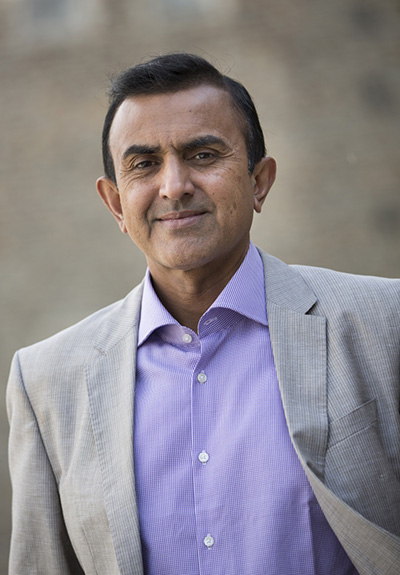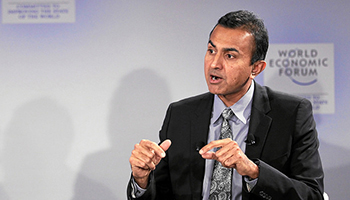
A ‘Once in a Lifetime’ Opportunity to Improve Mental Health Care
P. Murali Doraiswamy, MBBS, FRCP, professor of psychiatry and medicine at Duke University School of Medicine, doesn’t have to look far to see the toll the COVID-19 pandemic has taken on mental health, especially in the most vulnerable populations: in his Durham, North Carolina, research clinic, he works closely with adult and elderly patients suffering from anxiety, depression, and early dementia, many of whom have been hit particularly hard by the pandemic.
Since the onset of COVID-19, said Doraiswamy, “there’s probably been a threefold increase in anxiety and stress, especially in some segments of society,” with senior adults, children, people from low-income backgrounds, and people living alone experiencing the sharpest rise. “In some ways, I would call COVID-19 the greatest psychological stressor of our time,” he said.
Doraiswamy has been at the forefront of the global mental health response to the pandemic in his role as the co-chair of the prestigious World Economic Forum’s Global Future Council on Mental Health. The Council, comprising some of the world’s foremost thought leaders from academia, government, business, and civil society, is leading efforts to promote novel public-private initiatives to enhance mental health and resilience.

Mental health disorders are among the leading causes of suffering, job loss and deaths worldwide, and are projected to cost the global economy some $16 trillion by 2030. Even prior to the pandemic, providing sufficient mental health care was challenging because of numerous barriers including a shortage of therapists and socio-economic disparities.
The stresses the pandemic has imposed have exacerbated those conditions. But one silver lining of the COVID-19 pandemic is that it has shined a light on the importance of access to mental health care services for all and the need to proactively invest in mental wellbeing.
Leveraging this changing landscape, this fall, Doraiswamy and colleagues highlighted the top 10 most game-changing recent scientific advances with the highest near-term potential to enhance people’s mental lives. The list, which was published as a Special Report in Scientific American in September, is intended to be a roadmap for policymakers, political candidates, thought leaders, funders, and philanthropists who are looking to make key investments in mental health care.
Creating the list while deep in the trenches of the COVID-19 pandemic was a sobering experience for Doraiswamy, who directs the neurocognitive disorders program in the Department of Psychiatry and Behavioral Sciences in the Duke University School of Medicine. The patients he sees in his clinic illustrate clearly just how immediate the need is for effective new approaches to mental health care.
Doraiswamy and his colleagues in the World Economic Forum Global Council on Mental Health have more than a few ideas, which they highlighted in their Scientific American report. Among those they conclude are most ripe for implementation:
A Fully Vetted ‘Amazon’ for Mental Health Care Services
With limited access to mental health care and providers and clinics exacerbated by the COVID-19 pandemic, people suffering with mental health difficulties often look online for help, said Doraiswamy. The problem is that, although there are more than 10,000 apps claiming to treat mental health disorders on Apple and Google, it can be very unclear to the consumer which apps were designed based on the best clinical evidence.

That’s why Doraiswamy and his colleagues recommend an independently vetted (such as by government agencies or a psychiatric society) digital marketplace, where consumers could shop and download digital tools — mood apps, books, videos — that are the most scientifically sound. Several organizations such as OneMind, American Psychiatric Association, and the World Economic Forum, have already begun developing assessment criteria for these tools, and these assessments could allow innovators to receive a stamp of approval indicating that a product is clinically validated, ethical, secure, and effective.
Ethical Use of Artificial Intelligence to Pinpoint Vulnerable Populations
With more than four billion people around the world using social media, popular apps like Facebook, Instagram, Twitter, and TikTok have created huge data stores of personal information. Modern artificial intelligence and machine learning tools can be trained to mine this data in real time for specific language patterns and images that would indicate a person is experiencing a mental health crisis or considering self-harm. Once validated, these apps can be leveraged to assist clinicians in finding and helping vulnerable populations, said Doraiswamy.
Other important tools are clinically approved wearables and apps that allow people to upload their daily symptoms into an online database that can be accessed by mental health professionals. Doraiswamy and his colleagues say more medical centers should consider setting up “digital psychiatry clinics” to test the utility of these important devices and determine how best to enable psychiatrists to monitor patients in their day-to-day environments, rather than relying on self-reported (and recalled) symptoms while in the clinic.
“In this era of AI and technology, mental capital is our key asset,” said Doraiswamy. “We have a once in a lifetime opportunity to build the nation’s mental capital both by improving our health systems and reducing racial and financial inequities. Our future depends on it.”
Bringing the Power of Big Data Analytics to Predict Mental Health Needs
Another technological innovation ripe for advancement, say the forum authors, is the use of big data analytics to predict mental health needs. MindLinc, a tech company spun out of Duke Psychiatry and later purchased by Holmusk, has grown to become the largest electronic mental health records database of its kind, allowing researchers to predict when and where the next mental health crisis might occur and prepare accordingly.
“Holmusk has curated one of the largest mental health databases of its kind by aggregating electronic medical records from several health systems exclusively focused on mental health,” said Doraiswamy. “Researchers are able to see in real time when cases are increasing, diagnostic and treatment trends, health outcomes, effectiveness, and costs of care.”
Although Doraiswamy and his colleagues are ready to see these technologies adapted more widely by clinicians across the world, implementation will require overcoming a few hurdles. One of the biggest challenges will be acquiring funding to fully validate and implement large-scale technological interventions, said Doraiswamy. Another challenge will be convincing mental health care providers who may be averse to technology that these new digital tools can be useful. On top of that, ethical issues surrounding bias and access to private data need to be explored and regulations developed to protect the consumer.
Despite these challenges, Doraiswamy imagines a world where lessons learned from the pandemic can spur lasting changes. With growing recognition that mental and physical wellbeing are intricately linked to socio-economic and racial disparities, Doraiswamy thinks we’ve arrived at a critical moment in history.
“In this era of AI and technology, mental capital is our key asset,” said Doraiswamy. “We have a once in a lifetime opportunity to build the nation’s mental capital both by improving our health systems and reducing racial and financial inequities. Our future depends on it.”
Lindsay Key is the senior science writer for the School of Medicine and editor of the online storytelling magazine Magnify. Photos provided by P. Murali Doraiswamy.
